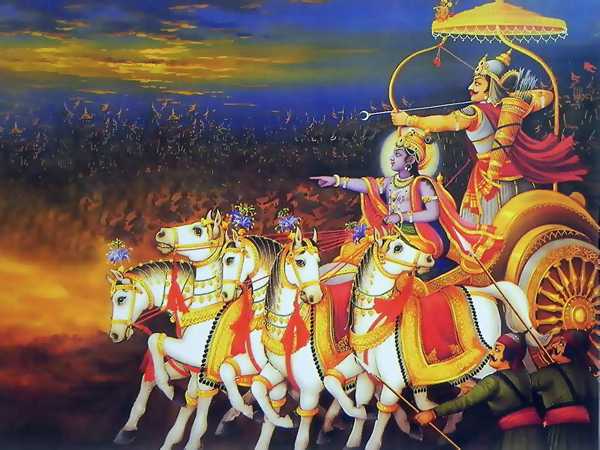Chapter 39

Vaishampayana said, “Having passed one night more, Rama, having theplough for his weapon, worshipped the dwellers of that tirtha and showedhis regard for Mankanaka. Having given wealth unto the Brahmanas, andpassed the night there, the hero having the plough for his weapon wasworshipped by the Munis. Rising up in the morning, he took leave of allthe ascetics, and having touched the sacred water, O Bharata, set outquickly for other tirthas. Baladeva then went to the tirtha known by thename of Usanas. It is also called Kapalamochana. Formerly, Rama (the sonof Dasaratha) slew a Rakshasa and hurled his head to a great distance.That head, O king, fell upon the thigh of a great sage named Mahodara andstruck to it. Bathing in this tirtha, the great Rishi became freed fromthe burthen. The high-souled Kavi (Sukra) had performed his asceticpenances there. It was there that the whole science of politics andmorals (that goes by Sukra’s name) appeared to him by inward light. Whileresiding there, Sukra meditated upon the war of the Daityas and theDanavas (with the gods). Arrived at that foremost of tirthas, Baladeva, Oking, duly made presents unto the high-souled Brahmanas.’
Janamejaya said, “Why is it called Kapalamochana, where the great Munibecame freed (from the Rakshasa’s head)? For what reason and how did thathead stick unto him?”
Vaishampayana said, “Formerly, O tiger among kings, the high-souled Rama(the son of Dasaratha) lived (for some time) in the forest of Dandaka,from desire of slaying the Rakshasas. At Janasthana he cut off the headof a wicked-souled Rakshasa with a razor-headed shaft of great sharpness.That head fell in the deep forest. That head, coursing at will (throughthe welkin) fell upon the thigh of Mahodara while the latter waswandering through the woods. Piercing his thigh, O king, it struck to itand remained there. In consequence of that head thus sticking to histhigh, the Brahmana (Mahodara) of great wisdom could not (with ease)proceed to tirthas and other sacred spots. Afflicted with great pain andwith putrid matter flowing from his thigh, he went to all the tirthas ofthe Earth (one after another), as heard by us. He went to all the riversand to the ocean also. (Not finding any relief) the great ascetic spokeof his sufferings to many Rishis of cleansed souls about his havingbathed in all the tirthas without having found the relief he sought. Thatforemost of Brahmanas then heard from those sages words of high importabout this foremost of tirthas situate on the Sarasvati, and known by thename of Usanasa, which was represented as competent to cleanse from everysin and as an excellent spot for attaining to (ascetic) success. ThatBrahmana, then, repairing to that Usanasa tirtha, bathed in its waters.Upon this, the Rakshasa’s head, leaving the thigh, fell into the water.Freed from that (dead) head, the Rishi felt great happiness. As regardsthe head itself, it was lost in the waters. Mahodara then, O king, freedfrom the Rakshasa’s head, cheerfully returned, with cleansed soul and allhis sins washed away, to his asylum after achieving success. The greatascetic thus freed, after returning to his sacred asylum, spoke of whathad happened to those Rishis of cleansed souls. The assembled Rishis,having heard his words, bestowed the name of Kapalamochana on the tirtha.The great Rishi Mahodara, repairing once more to that foremost oftirthas, drank its water and attained to great ascetic success. He ofMadhu’s race, having given away much wealth unto the Brahmanas andworshipped them, then proceeded to the asylum of Rushangu. There, OBharata, Arshtishena had in former days undergone the austerest ofpenances. There the great Muni Vishvamitra (who had before been aKshatriya) became a Brahmana. That great asylum is capable of grantingthe fruition of every wish. It is always, O lord, the abode of Munis andBrahmanas. Baladeva of great beauty, surrounded by Brahmanas, then wentto that spot, O monarch, where Rushangu had, in former days, cast off hisbody. Rushangu, O Bharata, was an old Brahmana, who was always devoted toascetic penances. Resolved to cast off his body, he reflected for a longwhile. Endued with great ascetic merit, he then summoned all his sons andtold them to take him to a spot where water was abundant. Those ascetics,knowing their sire had become very old, took that ascetic to a tirtha onthe Sarasvati. Brought by his sons to the sacred Sarasvati containinghundreds of tirthas and on whose banks dwelt Rishis unconnected with theworld, that intelligent ascetic of austere penance bathed in that tirthaaccording to due rites, and that foremost of Rishis conversant with themerits of tirthas, then cheerfully said, O tiger among men, unto all hissons, who were dutifully waiting upon him, these words, ‘He that wouldcast off his body on the northern bank of the Sarasvati containing muchwater, while employed in mentally reciting sacred mantras, would neveragain be afflicted with death!’ The righteoussouled Baladeva, touchingthe water of that tirtha and bathing in it, gave considerable wealth untothe Brahmanas, being devoted to them. Possessed of great might and greatprowess Baladeva then proceeded to that tirtha where the adorableGrandsire had created the mountains called Lokaloka, where that foremostof Rishis, Arshtishena of rigid vows, O thou of Kuru’s race, had byaustere penances acquired the status of Brahmanhood, where the royal sageSindhudwipa, and the great ascetic Devapi, and the adorable andillustrious Muni Vishvamitra of austere penances and fierce energy, hadall acquired a similar status.”




